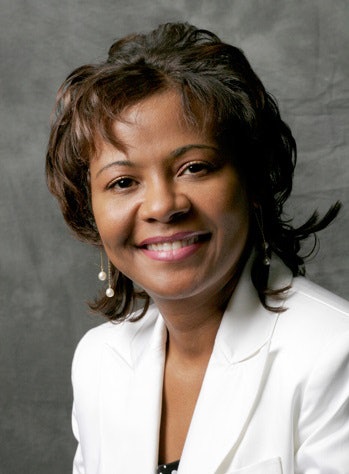Dr. Donna Y. Ford did it for her son.
She was single and 18 when she gave birth to Khyle, and he motivated her to aim higher.
 Dr. Donna Y. Ford
Dr. Donna Y. FordAn Illinois native raised in Cleveland, Ford enrolled at Cleveland State University and earned a bachelor’s degree in communications and Spanish, a master’s in counseling and a Ph.D. in urban education. Then she embarked on a career in higher education that ultimately landed her at Vanderbilt University as a permanent Cornelius Vanderbilt endowed chair and a professor of education and human development in the department of special education with a joint appointment in the department of teaching and learning.
“I wanted to be a role model for my son,” Ford says, reflecting on a career path that took her from Cleveland State to the University of Kentucky to the Ohio State University to Vanderbilt. “I wanted him to be proud, and I wanted to send a positive message about Black moms who have kids and aren’t married. Everything I did early on was to show my son what it means to be diligent and successful.”
That included making her own decisions.
“I was pushed into engineering,” she recalls, by advisers who told her she was smart and should study that field. But she didn’t like it and soon took a leave from college to deliver her child but returned in a year and graduated on time.
Informed by her life experiences, Ford’s areas of scholarship encompass gifted education with an emphasis on minority children and youth; recruitment and retention of racially different students in gifted education and Advanced Placement programs; closing achievement and opportunity gaps by race and income; equity issues in testing and assessment; and multicultural and urban education.
“My passion is both professional and personal,” she says. “It focuses on students who share my experience as a Black person who grew up in poverty. I want to make sure other Black children, especially those who live in poverty, don’t have their dreams denied or deferred.”
She feels driven to shut down the school-to-prison pipeline filled with Black males, a passion that led her to co-found the Scholar Identity Institute for Black Males at Vanderbilt.
“I am determined that I do everything I can to make sure this predominantly White teaching field becomes less racist and more culturally competent,” says Ford. “I’m tired of predominantly White institutions graduating teachers with no training in cultural diversity. They don’t even get them on the journey. This is why I’m always calling out racism, and I’m not going to back down.”
Ford teaches courses on cultural diversity in American education and improving educational outcomes for high-poverty youth. Through the Patterson Scholars program in Vanderbilt’s Peabody College of Education – where she became the first Black endowed chair in 2013 – she works with first-year students to groom them to become future teachers.
Ford has authored or co-authored nearly a dozen books and more than 200 published articles and book chapters. An in-demand speaker, she has given more than 1,000 presentations at school districts, professional conferences and elsewhere.
Early in her career, Ford considered concentrating on systemic problems that lead to overrepresentation of Black boys in special education. But there were so many other Black scholars focused on that issue, so she chose a direction informed by her and her son’s personal experiences – underrepresentation of Black students in gifted programs.
She has seen progress in the inclusion of Latino and Asian students in such programs, but not for Black students. Research indicates that “teachers have the most negative stereotypes and lowest expectations of Black students” regardless of socioeconomic status, and White teachers consistently under-refer high-achieving Black students to gifted programs, she says.
“I’m so angry and disappointed about what’s been going on overall in education with respect to special education and gifted children,” says Ford. “My goal is to share a counter-narrative and frame issues through a culturally responsive framework rather than a deficiency model. Challenge the status quo, and hold educators and administrators accountable.”
She also mentors and advocates through a Facebook group she co-established, R.A.C.E. (Research, Advocacy, Collaboration, and Empowerment) Mentoring. Its goal is to help doctoral students, faculty and administrators of color thrive in the academy.
Ford is “like the Harriet Tubman in Black gifted education,” says Dr. James L. Moore III, Ohio State University’s vice provost for diversity and inclusion, chief diversity officer and executive director of the Todd Anthony Bell National Resource Center on the African-American Male. “She has, in a brilliant way, bridged the gap between gifted education, urban education and multicultural education. She is one of the preeminent professors of our time in gifted education, particularly as it relates to educationally vulnerable children.”
Ford readily talks about how far she’s come, from modest means in Cleveland’s inner city to the highest endowed chair at one of the nation’s most elite schools. She wants others from similar backgrounds to know that, if she did it, so can they.
“Your zip code is not your destiny,” she says. “Your skin color is not your destiny. I believe in giving back and never forgetting where I came from.”
LaMont Jones can be reached at [email protected]. You can follow him on Twitter @DrLaMontJones.
This article appeared in the September 20, 2018 edition of Diverse. This is one in a series of profiles about distinguished professors of education.





















